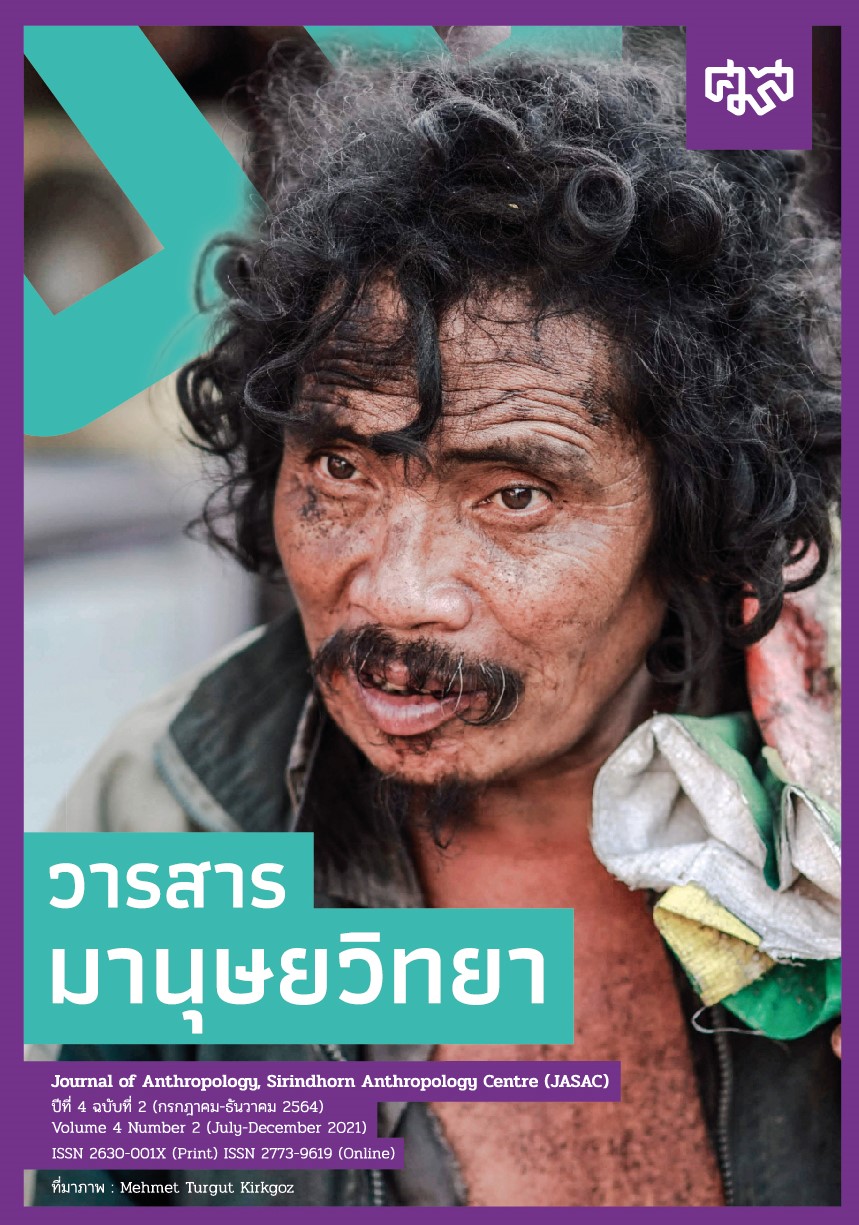ชาติพันธุ์วรรณาดิจิทัล ความท้าทายและแนวปฏิบัติด้านจริยธรรมการวิจัยในมนุษย์
Main Article Content
บทคัดย่อ
พัฒนาการอย่างก้าวกระโดดของอินเทอร์เน็ตและเทคโนโลยีดิจิทัลที่เกี่ยวข้อง ชีวิตประจำวันที่ยึดโยงอย่างแนบแน่นกับพื้นที่ออนไลน์จนกลายเป็นความธรรมดาสามัญ และมุมมองเกี่ยวกับ “สนาม” ที่เปลี่ยนแปลงไปส่งผลให้นักมานุษยวิทยาได้นำวิธีวิจัยเชิงชาติพันธุ์วรรณามาใช้ศึกษาปฏิสัมพันธ์ทางสังคมตลอดจนการสร้าง นำเสนอ และต่อรองอัตลักษณ์รูปแบบต่าง ๆ ของผู้คนในโลกเสมือนซึ่งนับวันยิ่งมีความซับซ้อนมากยิ่งขึ้น ลักษณะเฉพาะของชุมชนออนไลน์ที่ไม่เอื้อให้นักมานุษยวิทยาฝังตัวเพื่อสังเกตอย่างมีส่วนร่วมอย่างเต็มที่กับผู้คนในพื้นที่ดังกล่าวนำไปสู่การถูกตั้งคำถามในเชิงวิธีวิทยาและถูกท้าทายจากจริยธรรมการวิจัยในมนุษย์อย่างหลีกเลี่ยงไม่ได้ ดังนั้น นักมานุษยวิทยาซึ่งเคลื่อนย้ายจากการทำงานภาคสนามในพื้นที่กายภาพไปยังปริมณฑลดิจิทัลจึงต้องออกแบบและดำเนินการวิจัยที่ไม่เพียงเป็นรักษาขนบของสาขาวิชาเท่านั้นแต่ยังต้องคำนึงถึงความท้าทายและแนวปฏิบัติด้านจริยธรรมการวิจัยในมนุษย์ด้วย
Article Details

อนุญาตภายใต้เงื่อนไข Creative Commons Attribution-NonCommercial-NoDerivatives 4.0 International License.
ลิขสิทธิ์@ของวารสารมานุษยวิทยา
ศูนย์มานุษยวิทยาสิรินธร (องค์การมหาชน), กรุงเทพฯ, ประเทศไทย
ข้อมูลเพิ่มเติม:
https://creativecommons.org/licenses/by-nc-nd/4.0/
เอกสารอ้างอิง
จักรพันธ์ ขัดชุ่มแสง. 2563. “ข้อพิจารณาด้านจริยธรรมสำหรับงานวิจัยที่ใช้วิธีการสังเกตแบบมีส่วนร่วม,” สารชมรมจริยธรรมการวิจัยในคนในประเทศไทย 20(1): 1-8. สืบค้นจากhttps://research.psru.ac.th/files/download/res_718_28-05-2563.pdf (14 พฤษภาคม 2564).
จักรพันธ์ ขัดชุ่มแสง. 2561. “มานุษยวิทยากับจริยธรรมการวิจัยในมนุษย์,” วารสารมนุษยศาสตร์และสังคมศาสตร์ 35(2): 1-48.
เบญจรงค์ ถิระผลิกะ. 2563. “วิธีวิทยาแบบชาติพันธุ์วรรณาดิจิทัล : วิธีการศึกษาในพื้นที่เสมือน,” วารสารวิชาการนวัตกรรมสื่อสารสังคม 8(1): 76-88.
วิลาสินี พนานครทรัพย์. 2560. “วิธีการวิจัยเชิงชาติพันธุ์วรรณาในชุมชนออนไลน์,” วารสารธรรมศาสตร์ 36(2): 58-76.
American Anthropological Association. 2012. AAA Statement on Ethics. Retrieved from https://www.americananthro.org/LearnAndTeach/Content.aspx?ItemNumber=22869&navItemNumber=652 (June 24, 2021).
Association of Social Anthropologists of the UK. 2011. Ethical Guidelines for Good Research Practice. Retrieved from https://www.theasa.org/downloads/ASA%20ethics%20guidelines%202011.pdf (June 24, 2021).
Bluteau, Joshua M. 2019. “Legitimising Digital Anthropology through Immersive Cohabitation: Becoming an Observing Participant in a Blended Digital Landscape,” Ethnography. https://doi.org/10.1177/1466138119881165.
Canadian Institutes of Health Research, Natural Sciences and Engineering Research Council of Canada, and Social Sciences and Humanities Research Council. 2018. Tri-Council Policy Statement Ethical Conduct for Research Involving Humans. Retrieved from https://ethics.gc.ca/eng/documents/tcps2-2018-en-interactive-final.pdf (June 15, 2021).
Capurro, R. & Pingel, C. 2002. Ethical Issues of Online Communication Research. Retrieved from http://www.capurro.de/onres.htm (July 1, 2021).
Christensen, Line L. & Larsen, Malene C. 2020. Ethical Challenges in Digital Research: A Guide to Discuss Ethical Issues in Digital Research. 2nd edition. Developed by DIGETIK at Aalborg University as part of DIGHUMLAB.
Clifford, J. 1997. Routes: Travel and Translation in the Late Twentieth Century. Cambridge, MA : Harvard University Press.
Committee for Protection of Human Subjects. 2020. CPHS Guidelines – Internet-Based Research. University of California, Berkeley. Retrieved from https://cphs.berkeley.edu/internet_research.pdf.
de Seta, Gabriele. 2020. “Three Lies of Digital Ethnography,” Journal of Digital Social Research 2(1): 77-97. https://doi.org/10.33621/jdsr.v2i1.24.
Geertz, C. 1973. The Interpretation of Cultures: Selected Essays. New York: Basic Books.
Gupta, A. & Ferguson, J. (Eds.) 1997. Anthropological Locations: Boundaries and Grounds of a Field Science. Berkeley: University of California Press.
Hart, T. 2017. Online Ethnography. Digital Ethnography. In The International Encyclopaedia of Communication Research Methods. John Wiley & Sons, Inc. DOI: 10.1002/9781118901731.iecrm0172
Haverinen, A. 2015. “Internet Ethnography: The Past, the Present and the Future,” Ethnologia Fennica 42: 79–90. Retrieved from https://journal.fi/ethnolfenn/article/view/59290.
Howell, S. 2018. Ethnography. Retrieved from https://www.anthroencyclopedia.com/entry/ethnography (June 24, 2021).
Iphofen, R. 2013. Research Ethics in Ethnography/Anthropology, European Commision. Retrieved from https://ec.europa.eu/research/participants/data/ref/h2020/other/hi/ethics-guide- ethnog-anthrop_en.pdf (June 28, 2021).
Kaur-Gill, S & Dutta, Mohan J. (2017). Digital Ethnography. In The International Encyclopaedia of Communication Research Methods. John Wiley & Sons, Inc. https://doi.org/10.1002/9781118901731.iecrm0271
Marcus, George E. 1995. “Ethnography in/of the World System: The Emergence of Multi-Sited Ethnography,” Annual Review of Anthropology 24: 95-117.
Marcus, George E. & Fischer, Michael M. J. 1986. Anthropology as Cultural Critique: An Experimental Moment in the Human Sciences. Chicago: University of Chicago Press.
Markham, A. 2020. Doing Ethnographic Research in the Digital Age.
Markham, A. 2012. “Fabrication as Ethical Practice: Qualitative Inquiry in Ambiguous Internet Contexts,” Information, Communication & Society 15(3): 334-353. https://doi.org/10.1080/1369118X.2011.641993
Pritzker, Sonya E. 2020. Doing Online Ethnography: An Overview of Central Issues and Methodological Strategies. Retrieved from https://spritzker.people.ua.edu/uploads/6/0/3/8/60383273/pritzker_2020 _guide_for_conducting_online_ethnography.pdf (July 1, 2021).
Sade-Beck, L. 2004. “Internet Ethnography: Online and Offline,” International Journal of Qualitative Methods 3(2): 45-51.
Silverman, Marilyn. 2003. “Everyday Ethics: A Personal Journey in Rural Ireland, 1980-2001” In Pat Caplan (ed.), The Ethics of Anthropology: Debates and dilemmas, Pp. 115-132. London: Routledge.
The Norwegian National Research Ethics Committee. 2019. A Guide to Internet Research Ethics. Retrieved from https://www.forskningsetikk.no/en/guidelines/social-sciences-humanities-law-and-theology/a-guide-to-internet-research-ethics (July 5, 2021).
Ugoretz, K. 2017. A Guide to Unobtrusive Methods in Digital Ethnography. Retrieved from https://www.researchgate.net/publication/331287677_A_Guide_to_Unobtrusive_Methods_in_Digital_Ethnography (July 5, 2021).
Winson, Samuel M. & Peterson, Leighton C. 2002. “The Anthropology of Online Communities,” Annual Review of Anthropology 31: 449-467.
Wittel, A. 2000. Ethnography on the Move: From Field to Net to Internet. Forum Qualitative Sozialforschung / Forum: Qualitative Social Research, 1(1), Art. 21, http://nbn-resolving.de/urn:nbn:de:0114-fqs0001213.


